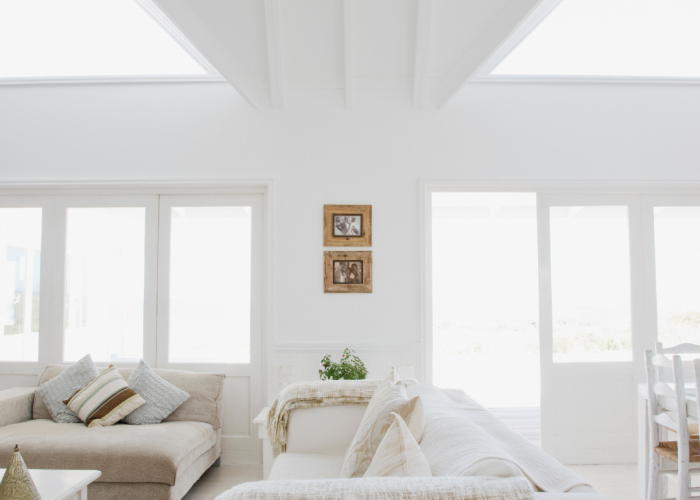I sat down with Real Estate expert & Founder of Live with Plum, Justine Chan, to answer all of your pressing property & home buying questions.
Welcome Justine, so happy to have you here. Before we get started tell us a little bit about yourself, I’d love to hear your story!
[Justine] I am the Founder of Live with Plum, an instagram account and blog focused on real estate. I am a licensed real estate agent in New York City and with my platform trying to demystify home buying so everyone can do it in the most educated manner possible.

Awesome, So nice to have you here. The first question I got was should you prioritize saving for retirement or saving for a home?
First, you should figure out your why. Have you been moving around a lot and ready to settle down? That’s totally fine, it does not have to be a purely financial decision. You might have children, parents you want to look after and that’s the right decision for you at that point in time.
Or it can be more financial and you expect it to appreciate. Let’s say you live in Austin, TX for example. Austin real estate market is only going to get more expensive in the next five years. You will also want to take the timing of when you’d be ready into consideration.
Then, another thing to think about is, over the past two years, we’ve had a really low, low rate environment. So, there are a couple of things where you can opportunistically also say, this is the right time for me to buy real estate, because the interest rates are so low and I want to lock it in. So, to me it’s always kind of like an evolving conversation with yourself.
I think fundamentally investing in whatever you choose to invest in is the most important thing. And then when you want to buy real estate takes into consideration, the macro environment takes into consideration your personal life choices.
[Jessica] Yeah, I definitely agree with a lot of that. I also think a lot of people associate their primary residence as an investment, which isn’t always the case. When you take into account all of the money that you put into your house over the years of all of the taxes and insurance that you’re going to pay, you have to really take that into account compared to what you would be paying in rent.
And, in some circumstances, if you’re not going to be there that long or in a major city like New York or San Francisco, a lot of times it does end up being cheaper to rent because, because you can’t live in that location without paying way more.
So what are your thoughts on this low interest mortgage environment?
Interest rates are making your monthly payment lower and therefore people think they can actually pay more, So I would say as best as you can try and be a little bit contrarian that’s when you find more use, right. When it’s a seller’s market, you are the president who’s selling. When it’s a buyer’s market, you are the person who’s buying. So you’re not kind of working against the flow of the market. That would be the most ideal situation.
So you preferably are not buying in a sellers market, you preferably are buying in a buyers market. And you probably are selling in a sellers market and not buying in a sellers market. If you have personal reasons for why you are choosing to buy right now, even though it’s a sellers market in many areas, that’s, that’s everyone, everyone has a prerogative to make that choice.
What are you actually paying for when you are renting vs. owning a home?
Many people do not fully consider the cost of ownership. When it comes to your rent, the expenses are pretty straightforward. It’s basically your rent, maybe renter’s insurance, that’s about it.
The cost of home ownership is much less straightforward. And many people, only think about maybe their mortgage costs. When you sell, the cost to sell is a lot higher cost of purchase, typically because it’s mostly going to be mortgage origination costs, or maybe a couple of like taxes here and there, but in the cost of close, especially to use a real estate agent is very high.

What are the major things you should do before purchasing your first home?
So, really one of the most important things you can do is get your credit score in place. It will have a tangible difference in the kind of rates that you are qualified for.
Secondly, if it’s close enough on the horizon is to figure out what your criteria really is and therefore how much you’ll be saving up.
If you could offer advice to first time homebuyers, what would it be?
If you’re looking to purchase a property, speak to a mortgage banker or broker, as soon as you can. They will give you an indication of you can generally qualify for and therefore, what kind of down payment options you have and also need to budget for. It’s really important to just speak to professionals because they can at least advise you on what mortgage options available for you.
Would you recommend a 15 or 30 year mortgage?
[Jessica] I have heard some contradictory things about it. What I have been reading was essentially, even if you want to pay it off in 15 years, get a 30 year mortgage just in case something comes up and you know, you lose your job and you’re not all to that, but would like to get your opinion on that.
[Justine] Always the interesting thing right now in this environment is that the rates are already so low, that many people consider the discrepancy between 15 and 30 years to be very small. And therefore, you are hearing what you’re hearing, which is what did you just get at 30 year? There’s no prepayment penalty.
So, if you want to pay it off in 15 years, that’s totally fine too. You’re paying like this additional interest rate just to have kind of the, you know, safety cushion, right.
So that’s why you’re hearing a lot of that, which is which, you know, I can totally see the fundamentally agree with. I don’t have 15 year mortgages. I like to keep my debt to income ratio lower, because you know, it means that I’m leaving more leeway to on more loans down the line, if I do want to buy more rental properties.
So that’s just something to think about. You’re taking on essentially on a monthly basis, a higher debt payment, and therefore your debt to income ratio will actually go up in the lenders eyes the next time that you choose to purchase versus the 30 year.
Thank you so much for your time Justine. This has been so informative! Where can my readers find you?
They can find me on instagram @livewithplum or my blog. Thank you!






